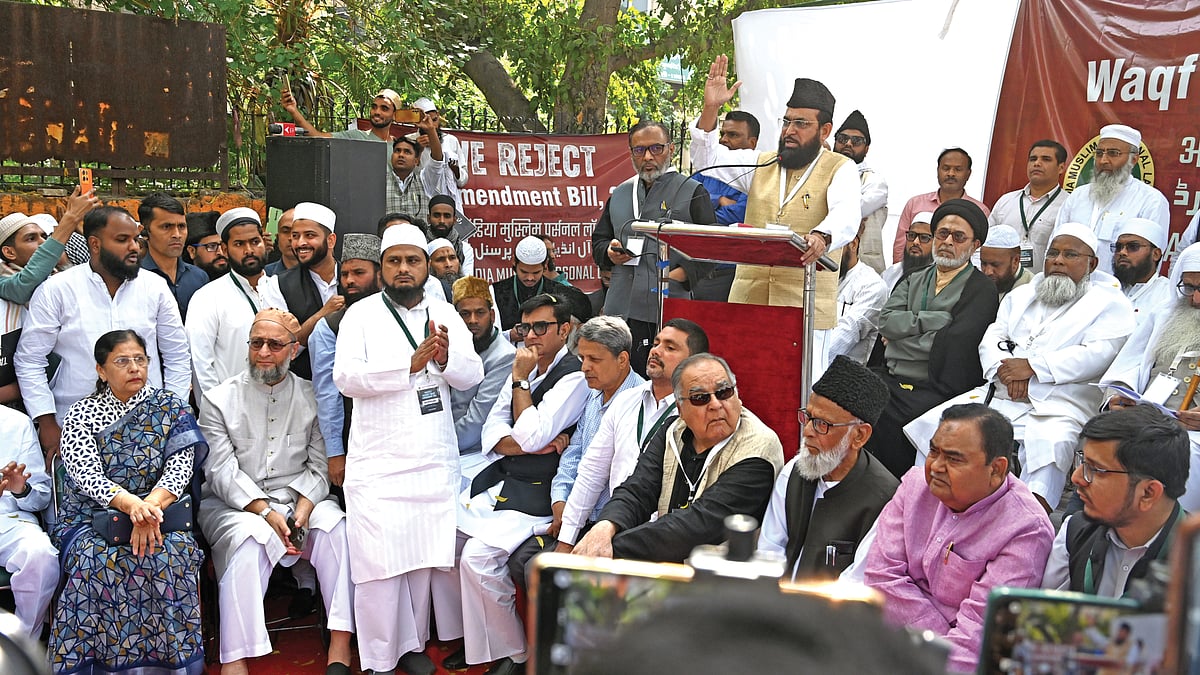POLITICS
Muslim bodies welcome SC stay on key waqf law provisions, expect 'complete justice'
Both AIMPLB and AISPLB describe ruling as step in right direction, though AIMPLB disappointed that SC didn't suspend entire Act

Muslim organisations on Monday cautiously welcomed the Supreme Court’s decision to put several controversial provisions of the Waqf (Amendment) Act, 2025, on hold. While they see this as “significant relief”, many remain hopeful that the court will eventually strike down the entire law.
Both the All India Muslim Personal Law Board (AIMPLB) and All India Shia Personal Law Board (AISPLB) described the ruling as a step in the right direction. The AIMPLB, however, made no bones about its disappointment that the Supreme Court stopped short of suspending the entire Act.
Khalid Rashid Farangi Mahali, an executive member of AIMPLB, told PTI:
“Muslims and the AIMPLB wanted a stay on the entire Waqf (Amendment) Act, which the Supreme Court refused. The Court said the stay cannot be imposed on the entire waqf law, but it put on hold certain provisions, which is a welcome step. We have got significant relief and hope to get complete relief when the final judgement comes.”
He pointed out that the apex Court’s direction to ensure that the CEO of a waqf board comes from the Muslim community was reassuring, but flagged concerns about the continuing presence of non-Muslim members on waqf boards. “The Constitution gives freedom of religion to all Indians, and waqf is an integral part of Islam,” Mahali stressed, arguing that other faith-based trusts don’t face similar interference.
Published: undefined
For now, the Supreme Court has pressed pause on rules such as the five-year requirement for a Muslim to dedicate property as waqf and the authority given to district collectors to decide the status of waqf properties. The bench, headed by Chief Justice of India B.R. Gavai and Justice Augustine George Masih, also limited the number of non-Muslim members: no more than four in the 20-member Central Waqf Council and three in 11-member state boards.
The AISPLB took a more conciliatory line. General secretary Yasoob Abbas said: “We honour the judgement given by the Supreme Court. The way in which the Joint Parliamentary Committee toured India, got the Bill passed by Lok Sabha and Rajya Sabha overnight, and also got the approval of the president, we had no other option but to move the Supreme Court. We have full faith in our courts, and we are hopeful of getting justice.”
But he too urged the bench to revisit the question of non-Muslim membership.
Political reactions have been predictably split. Uttar Pradesh minister for minority welfare, Danish Azad Ansari, called the judgement a vindication of the Modi government’s policies: “Our government will do everything needed for the Muslims. The Waqf (Amendment) Act will open new avenues of development for the Muslims.”
Former UP minister Mohsin Raza went further, framing the ruling as a setback for the petitioners: “This is a defeat for them. As far as the issue of three members of the waqf board being non-Muslims is concerned, the board is a Constitutional body.”
Published: undefined
He argued that just as the Supreme Court had upheld the triple talaq ban and the abrogation of Article 370, it was once again siding with reforms the Modi government deems necessary.
Predictably, Opposition voices were more sceptical. Samajwadi Party MLA Iqbal Mahmood pointedly asked: “Can we make any Muslim a member of the Ram Temple Trust?” A reminder that for many, the idea of non-Muslims shaping waqf decisions feels like an infringement on religious autonomy.
Meanwhile, clerics like Bareilly-based Maulana Shahabuddin Razvi saw the verdict in a positive light. Calling it “very good” and “balanced”, he said it raised hopes that waqf lands could be reclaimed from encroachers and used to build schools, hospitals and other community institutions.
The broader picture is this: the Supreme Court has offered partial relief but kept the bigger battle alive. On one hand, it has curbed some of the government’s more sweeping powers under the new law. On the other, it hasn’t fully addressed Muslim bodies’ deeper anxieties about religious autonomy and representation. For now, the judgement leaves both sides with enough to claim a measure of victory — though the real test will be in the final ruling.
With PTI inputs
Published: undefined
Follow us on: Facebook, Twitter, Google News, Instagram
Join our official telegram channel (@nationalherald) and stay updated with the latest headlines
Published: undefined